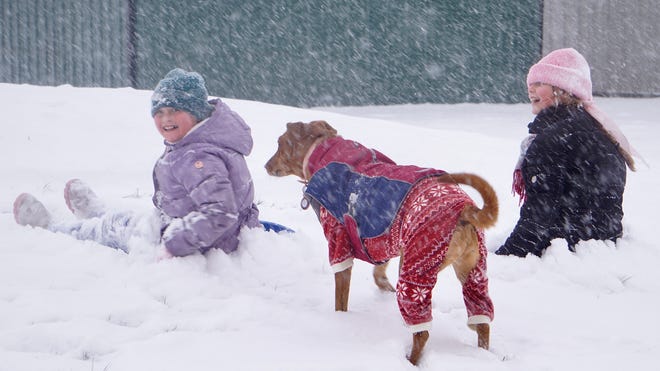Have an outdoor dog, or does yours just love to romp in the snow?
When bitterly cold temperatures loom, you should be considering when to bring them inside.
So how cold is too cold? Here’s what veterinarians have to say.
How cold is too cold for dogs? When to bring them indoors
When to bring your dog inside depends on what breed of dog you have, Dr. Jennifer Coates writes for PetMD. A comfortable temperature for one dog might make another shiver.
In general, dogs with thick, double-layered coats of fur, such as Siberian huskies, Newfoundlands, and Samoyeds, are the most cold tolerant. Many originate in northern climates, Coates writes, and have adapted to thrive when the temperature drops.
As long as these arctic breeds have insulated, windproof and waterproof shelters with access to fresh, unfrozen water, adult dogs accustomed to the cold can be outside in temperatures well below zero for as long as they want, writes Dr. Sarah Wooten for Hills Pet.
Other factors, according to Coates, are the dogs’ size (smaller dogs get cold faster than larger dogs), coat color (darker coats absorb more heat from the sun than lighter coats), and the dogs’ age and health (puppies, senior dogs and those with health issues cannot regulate their body temperature as well as dogs in their prime.)
Dog breeds that can’t handle the cold, such as chihuahuas, Yorkies and Italian greyhounds, shouldn’t spend longer than 10 to 15 minutes in temperatures between 10 and 32 degrees, Wooten writes. They shouldn’t be outside at all in weather below 10 degrees.

Think you’re too old to shovel snow?You might be surprised at when you should quit
What are the cold weather risks to dogs? What are the signs of frostbite, hypothermia?
If dogs are outdoors in the freezing weather too long, they’re at risk of hypothermia, dehydration, dried or cracking paw pads, and frostbite, among other ailments, per Wooten.
Hypothermia happens when a dog’s body temperature is abnormally low. Symptoms include shivering and tiredness. They may look uncomfortable, per Wooten, and may be huddled next to the door, wanting to come inside. If your dog is showing signs of hypothermia, bring them inside immediately and wrap them in towels that are warm from the dryer.
If your dogs have frostbite, they may be holding up one paw or another. Frostbite commonly occurs on the webbing in between the toes and the tips of the ears. If you suspect frostbite, apply a warm, wet compress to the affected area and call your veterinarian. Pat your dog’s skin dry instead of rubbing it. Also, don’t use heat on any areas you suspect have frostbite.
This post was originally published on this site be sure to check out more of their content.














































